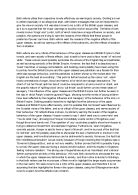Both writers utilise their respective novels effectively as warnings to society. Golding’s novel is written especially in an allegorical style, with hidden messages that can be interpreted to give his view on society. Hill was also known to be a critic of the British upper classes, and so it is no surprise that her major warnings to society revolve around this. The titles of both novels involve ‘Kings’ and ‘Lords’, both of which roles have a large influence on society, and possibly, the authors are trying to warn the readers of the effects that these people in positions of power can have. Both writers warn the readers of the negative effects of the upper classes, as well as warning of the effects of the patriarchy, and the effects of isolation from civilisation.
Both writers are very critical of the behaviour of the upper classes and British Empire in their novels, and warn society of these effects. Jack is said to have used a face ‘mask’ of ‘red and white’. These colours could possibly symbolise the colours of the English flag and patriotism, as well as being symbolic of the British Empire. However, the fact that it is described as a ‘mask’ has tribal, or savage connotations, and Golding could possibly have been using this to portray how the British Empire and the upper classes use patriotism as a facade for their otherwise savage behaviour, and this patriotism is further shown by the exclamation ‘the English are the best at everything’. This point is further backed up the colour ‘red’, which holds connotations of anger, blood and hatred, all of which are savage descriptions. The chant of ‘cut her throat, spill her blood’ could be compared to an army march or chant, and the graphic nature of ‘spilling blood’ and a ‘cut throat’ could further convey these ideas of savagery. This influence of the upper classes and the British Empire can further be seen in the way in which Ralph ‘machine gunned Piggy’, showing how the minds of young children have been affected by the negative influence and ‘savagery’ of the behaviour of the army or British Empire. Golding possibly does this to highlight how the behaviour of the upper classes and British Empire affect society, and it is possible that he himself was influenced by the Socialist views of his father, and so is critical of the upper classes, and warns society of their behaviour. Hill reflects these motives, by similarly warning the reader of the negative behaviour of the upper classes. Hooper is seen to say ‘I didn’t want you to come here’ and ‘You do what I say’, showing how Hooper immediately exerts control of Kingshaw, even though they have barely met. This repetition of ‘you’ could also possibly show how Hooper is trying to distance himself from and alienate Kingshaw. Furthermore, when Kingshaw commits suicide, Hooper is said to have a ‘spurt of triumph’, and he is proud of the fact that he ‘did that’, and Hill possibly uses this to showcase the lack of sentiment or emotion in the upper classes, and how this behaviour can be detrimental to society. Moreover, the fact that this ‘relentless persecution’ occurs mainly because of Hooper learning that Kingshaw was a ‘Governor’s Bequest Boy’, and so not very wealthy, further proves that Hill is possibly trying to convey the upper class as having a closed-minded outlook, and this results in Kingshaw feeling ‘extreme isolation’. The strong use of superlatives such as ‘relentless’ and ‘extreme’ further portrays the severity of this behaviour. Hill most likely does this to showcase the way in which the upper classes are detrimental to society, and this motive is similar to Goldings, in that both writers use the microcosm of their novel to highlight the larger-scale occurrences in the real world. Hill was known to be a critic of the upper classes, and therefore it is not surprising that she highlights the flaws in the upper classes, using her Bildungsroman-style novel to explain how this affects even children.









